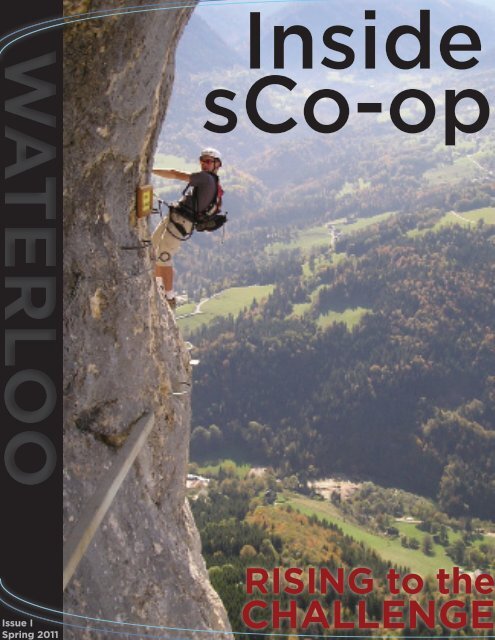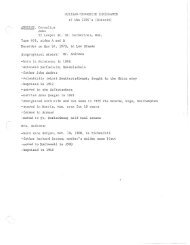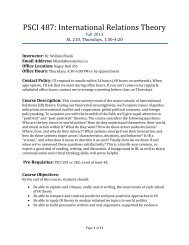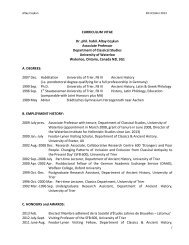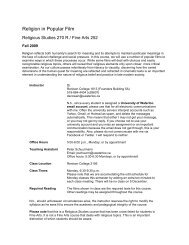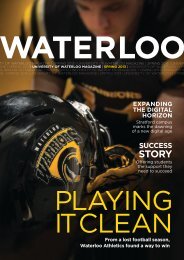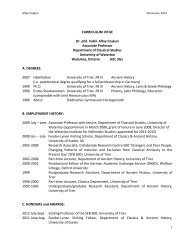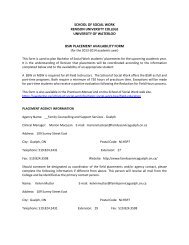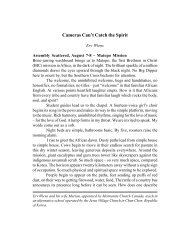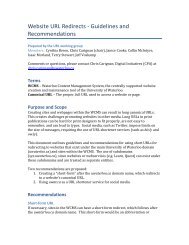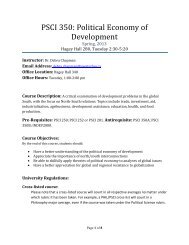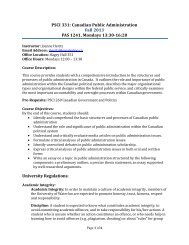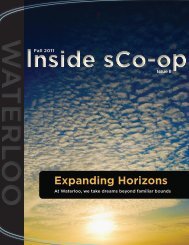CHALLENGE - University of Waterloo
CHALLENGE - University of Waterloo
CHALLENGE - University of Waterloo
Create successful ePaper yourself
Turn your PDF publications into a flip-book with our unique Google optimized e-Paper software.
WATERLOO<br />
Inside<br />
sCo-op<br />
RISING to the<br />
Issue I<br />
Spring 2011<br />
<strong>CHALLENGE</strong>
INSIDE sCO-OP: Contents<br />
The Inside sCo-op is a bi-term student e-publication released<br />
through Co-operative Education and the Centre for Career<br />
Action at the <strong>University</strong> <strong>of</strong> <strong>Waterloo</strong>.<br />
Inside sCo-op<br />
3<br />
5<br />
Fashion, Passion & EDAC<br />
Maple Tay and her reflections on her<br />
unpaid term with an NPO<br />
Making the Best <strong>of</strong><br />
the Work Term Blues<br />
Lessons learned from Alex Hogeveen-Rutter’s<br />
not-so-ideal work term<br />
6<br />
Chris & Criminal Law<br />
Arranging a job with a defence law firm<br />
7<br />
9<br />
Employer Spotlight: S. S.<br />
Papadopulos & Associates<br />
Meet the employer and the student<br />
Career Corner: JobMine Solutions<br />
Helpful hints and future plans for JobMine<br />
CREDITS<br />
Editor: Alana Rigby, Media & Publications Associate<br />
Staff Editor: Olaf Naese, Communications & Public Relations Administrator<br />
Photos: Calvin Yan, John Tang, Lisa ter Woort, Alex Hogeveen-Rutter,<br />
James Ehrman
Inside sCo-op<br />
E D I T O R<br />
Although the weather has been unusually cruel to us this year, I can’t<br />
help but anticipate all the awesome things that come with the start <strong>of</strong><br />
spring term. Personally, I’m a fan <strong>of</strong> hiking and sleeping under the stars,<br />
<strong>of</strong> weekends spent camping and day-trips to conservation areas.<br />
What I enjoy most about camping is the challenge <strong>of</strong> getting myself<br />
outside, roughing it up away from my laptop, my hair straightener, and<br />
all the other urban comforts I so liberally indulge in. I think that many<br />
<strong>of</strong> us love challenges, and whether it’s competing in a national chess<br />
tournament or beating our personal best lap record, we all love to win.<br />
Interviewing co-op students has made me realize that this love for being<br />
the best, for surpassing that high score, is something we do time<br />
and time again while on work terms. For Chris Gunn-Isaacs, the challenge<br />
came before the work term even began – he pushed himself to<br />
arrange a job that was exactly what he wanted. Similarly, Maple Tay<br />
motivated herself to commit strongly to a cause; she spent an unpaid<br />
work term fundraising for Eating Disorders Awareness Coalition. And<br />
CECS REMINDERS<br />
For Students on Co-op<br />
By now you should have logged onto ANGEL and<br />
familiarized yourself with the materials for your PD<br />
course. Stay up-to-date and complete all assignments<br />
to recieve credit for the course.<br />
To find out more, view WatPD’s webpage at http://www.<br />
watpd.uwaterloo.ca/about/courses.html.<br />
Alana Rigby<br />
2A English literature & rhetoric<br />
Alex Hogeveen-Rutter faced down a challenge many co-op students might shirk at – making the best <strong>of</strong> bad<br />
circumstances while on a work term. Read about their successes, and then challenge yourself to master JobMine<br />
with some <strong>of</strong> the tips provided in this issue’s Career Corner section.<br />
But don’t get overconfident - the challenges don’t end with graduation or with that full-time job. Employer Chris<br />
Muffels illustrates this as he, with his co-op students, tackles hydrogeology problems that stump experts worldwide.<br />
His current co-op, James Ehrman, helps out with those problems, while also pursuing a thousand<br />
different hobbies.<br />
James demonstrates an important point in doing this. While rising to the challenge in a work setting is always<br />
important, it’s equally essential that we challenge ourselves personally. Challenge ourselves to try new things,<br />
meet new people, learn new skills. Challenge ourselves to better ourselves, because in the end, that’s what our<br />
education is meant to do.<br />
But before you get to that, I’ll give you a more reasonable challenge: read this issue <strong>of</strong> Inside sCo-op. I guarantee<br />
you’ll learn something.<br />
Keep up with your PD courses!<br />
For Students in the interview Cycle<br />
Look into info sessions and workshops!<br />
Alana<br />
Check out the Employer Information Session calendar to<br />
see when and where your future employer is presenting on<br />
campus: http://cecs.uwaterloo.ca/students/sessions.php.<br />
If you’re looking to brush up on interview skills or curious<br />
about grad school opportunities, check out the Student<br />
Workshop calendar: https://strobe.uwaterloo.ca/cecs/cs/<br />
index.php?page=Public.Workshops<br />
2
FASHION<br />
PASSION<br />
& E D A C<br />
Maple Tay & the lessons she’s learned<br />
from her enriching term with EDAC.<br />
Inside sCo-op<br />
PAY IS AN integral part <strong>of</strong> the coop<br />
experience. There’s no denying<br />
this fact: pay defines the employer-employee<br />
relationship, it puts a<br />
price on the value <strong>of</strong> our work, and<br />
it adds a dimension <strong>of</strong> accountability<br />
to our duties. But it’s true<br />
that not all co-op jobs need to be<br />
paid experiences – a work term<br />
can be just as rewarding and just<br />
as meaningful without the aspect<br />
<strong>of</strong> monetary reciprocation.<br />
Maple Tay, a 3A public accounting<br />
student, arranged one <strong>of</strong> these<br />
unpaid co-op jobs. It was her first<br />
work term, a term with Eating Disorders<br />
Awareness Coalition (EDAC).<br />
Pursuing an Unpaid Work Term<br />
“Fresh from first year, I was unsure about the kind <strong>of</strong> work I really wanted to do,” Maple says, describing her initial job<br />
application process. “I found EDAC on the KW Volunteer Action Centre website, and their dedication to the community<br />
inspired me.” EDAC is a not-for-pr<strong>of</strong>it organization that has only one paid employee: its executive director.<br />
The group is engaged in spreading understanding <strong>of</strong> and re-educating people to the danger and prevalence <strong>of</strong> eating<br />
disorders. As Maple put it: “our society needs to understand that, for people suffering from eating disorders, it’s not<br />
about what they’re eating but rather about what’s eating them.”<br />
Her passion for EDAC’s mandate<br />
was a prime factor in causing her<br />
to consider employment with them.<br />
“EDAC was facing a financial crisis<br />
and had a high possibility <strong>of</strong> termination<br />
within months,” Maple<br />
explains. Her work term helped the<br />
organization combat the recent<br />
government cut to the non-forpr<strong>of</strong>it<br />
sector; while with EDAC Maple<br />
organized a major fundraiser.<br />
Maple knows that many people<br />
consider pay the defining aspect<br />
<strong>of</strong> co-op, but she’s entirely satisfied<br />
with her unpaid term. “It’s the<br />
skills you develop, the experience<br />
you gain and the people you meet<br />
during your co-op job that define<br />
how successful it is. Getting paid is<br />
simply the icing on the cake.” And<br />
sometimes, as Maple believes, co-op<br />
students can do without the extra<br />
sugar.<br />
Event co-ordinators Pelagia and Maple<br />
pose with EDAC execs<br />
Models, Network Connections<br />
and Community Leaders<br />
Many <strong>of</strong> these acquaintances Maple<br />
made through her door-to-door canvassing<br />
in malls and around Kitchener.<br />
She visited stores and restaurants<br />
looking for silent auctions donations,<br />
managing to snag the Cora’s<br />
that opened in uptown <strong>Waterloo</strong> as a<br />
major sponsor. Together with fellow<br />
co-op student Pelagia Cao, Maple coordinated<br />
EDAC’s largest fundraiser: a<br />
fashion show.<br />
“I got to meet so many inspiring and<br />
accomplished individuals from the<br />
community while working,” Maple<br />
said, describing how her term with<br />
EDAC helped her expand her network.<br />
“Two <strong>of</strong> the volunteers even<br />
work at the company I’m at now,<br />
Pricewaterhouse Coopers.”<br />
continued on next page...<br />
3
Inside sCo-op<br />
“The theme <strong>of</strong> the show was Reshaping Fashion and I recruited people from<br />
all walks <strong>of</strong> life, varying ages, sizes and occupations, to be models. It was an<br />
amazingly diverse group <strong>of</strong> people!” The show was an ultimate success, meeting<br />
the organization’s goal <strong>of</strong> raising enough money to end their fiscal year in<br />
black (i.e., not in debt). It operated under the peppy slogan: “confidence is<br />
the best accessory and waaaay cheaper than a new pair <strong>of</strong> shoes.”<br />
Maple found work that was meaningful for her and she took many valuable<br />
lessons away from it. “It’s important to find a job that’s suited to you. Don’t limit<br />
your choices to what you are supposed to be doing,” she urges other students.<br />
Considering an unpaid work term like Maple’s?<br />
The Canadian Association for Co-operative Education implicitly states that<br />
remuneration is a requirement for accreditation <strong>of</strong> work terms. However, under<br />
special circumstances unpaid work terms are approved, assuming they conform<br />
to the guidelines established by <strong>Waterloo</strong>’s Co-operative Education department.<br />
Co-operative Education has recently updated the guidelines for approving<br />
unpaid work terms. The guidelines can be found here: http://www.cecs.uwaterloo.ca/news/new_guidelines_unpaid_terms.php<br />
Maple and Ryan, <strong>Waterloo</strong> student<br />
and model for the show<br />
Rocco Fondacaro is CECS’ director <strong>of</strong> student and faculty relations. He was one<br />
in a committee <strong>of</strong> CECS staff, students and faculty representatives responsible<br />
for drafting the new guidelines. He spoke with the Inside sCo-op about the<br />
guidelines:<br />
What sparked the decision to update the<br />
guidelines for unpaid work terms?<br />
The need arose because there were no clear, definitive<br />
guidelines in place. Often the economic climate influenced<br />
the number <strong>of</strong> unpaid terms approved. We established<br />
a minimum set <strong>of</strong> requirements to maintain a<br />
certain quality level for our jobs and to allow us to<br />
continue to adhere to our accreditation requirements.<br />
What factors influence the approval <strong>of</strong> unpaid<br />
work terms?<br />
All the stipulations <strong>of</strong> guidelines must be met. Then, I<br />
and the assistant directors at CECS work with the faculty<br />
and the associate deans <strong>of</strong> co-op to discuss the notion<br />
<strong>of</strong> job relevance. So if the job allows for the attainment<br />
<strong>of</strong> core competencies that are recognized as key by the<br />
faculty, then an unpaid work term is likely to be<br />
approved.<br />
What are the most significant changes in these new<br />
guidelines?<br />
Quite simply, we sought to formalize conventions that<br />
had long been in place. Now the guidelines specify that<br />
unpaid jobs must be with a registered charity. The organization<br />
cannot be one that typically pays students that<br />
they hire. We’ve also included <strong>Waterloo</strong> initiatives, such<br />
as the competitive teams, like Midnight Sun. This way,<br />
when we get our work terms accredited, we can say “this<br />
many jobs were unpaid, and we’ve documented all the<br />
conditions and circumstances around them.”<br />
Are unpaid jobs typically proposed by students?<br />
Yes. A student will come forward with a Job Information<br />
Form, saying “I want this job and it’s unpaid.” We assess<br />
that particular case and make a decision, yes or no.<br />
4
MAKING the BEST <strong>of</strong> the<br />
WORK TERM BLUES<br />
Inside sCo-op<br />
AS CO-OP STUDENTS, we’re encouraged to experiment with our work terms. Sometimes we take a job in a field<br />
we’ve never tried before. Sometimes we take a job and discover it’s not quite what we thought it’d be, based on the<br />
job description. Sometimes we take a job, the unforeseeable happens, and we’re left to cope in a less-than-pleasant<br />
situation.<br />
That last circumstance happened to 3B electrical engineering student, Alex Hogeveen-Rutter. He’d taken a particular<br />
co-op job largely because he had such immediate chemistry with his would-be supervisor. Then, at the end <strong>of</strong> the<br />
first week <strong>of</strong> the work term, that supervisor quit.<br />
“My first instinct,” Alex recalls, “was to find a new job. My immediate supervisor was gone and I was now reporting to<br />
that supervisor’s boss – a person who was never in town. I was crushed.” But he didn’t quit. Instead, Alex “warmed to<br />
the challenge” and became his own boss.<br />
A Paradox in Learning<br />
“The fundamental lesson is that sometimes it’s the<br />
least favourable situations that make you learn and<br />
grow the most,” Alex says, looking back on that<br />
term. Initially, he was disappointed and worried – he<br />
was an engineering co-op now left to work in a company<br />
with no senior engineer to supervisor him. Occasionally,<br />
his other colleagues would throw work his<br />
way, but for the most part that entailed tedious jobs<br />
that needed completion rather than work intended<br />
to facilitate his learning.<br />
So Alex became more proactive. “Asking questions,<br />
identifying problems, brainstorming or sharing solutions<br />
with others,” these were the actions he took<br />
in search <strong>of</strong> meaningful work. “I hoped that once<br />
I’d demonstrated my knowledge and presented<br />
some suggestions, I’d be assigned as the one to fix<br />
the problem.” Being inquisitive was vital for Alex:<br />
“I found it was most useful to ask questions, especially<br />
<strong>of</strong> those employees whose concerns are <strong>of</strong>ten<br />
overlooked. I even learned how to do some <strong>of</strong> the<br />
other employees’ jobs, and that type <strong>of</strong> hands-on<br />
work was especially interesting to me, given my very<br />
academic background.”<br />
Although Alex admits the work term was not his<br />
most fulfilling in terms <strong>of</strong> developing skills specific<br />
to his field, he knows that he’s grown from it. Operating<br />
without direct supervision forced him to<br />
become more independent. Seeking out valuable<br />
projects made him more resourceful. Interacting<br />
with a variety <strong>of</strong> people from different educational<br />
and experiential backgrounds helped him become<br />
more broadminded. His experience demonstrates<br />
that building your technical skill set isn’t the only asset<br />
<strong>of</strong> co-op. From all work terms, even those we’re<br />
less than enthused about, we can learn s<strong>of</strong>t skills<br />
that will apply in all facets <strong>of</strong> life.<br />
Transferable skills aside, the simple experience <strong>of</strong><br />
being a pr<strong>of</strong>essional, <strong>of</strong> working in an <strong>of</strong>fice or a<br />
manufacturing plant, is a learning process in and <strong>of</strong><br />
itself. “That’s the biggest distinction when I go to<br />
visit my family in Manitoba,” Alex explains. “I see my<br />
high school friends and I see the difference in outlook,<br />
the difference in lifestyle and the difference in<br />
maturity. That’s all a result <strong>of</strong> my work terms.”<br />
Reflecting on Experiences<br />
Alex is also a writer for Iron Warrior,<br />
the Engineering paper<br />
Although ‘critical<br />
thinking’ and<br />
‘active reflection’<br />
are phrases<br />
co-ops tend to<br />
groan about,<br />
soundbytes all<br />
too <strong>of</strong>ten associated<br />
with writing<br />
the dreaded Work<br />
Report, Alex has a<br />
more laissez-faire<br />
approach to reflective<br />
exercises.<br />
“It’s not like a diary where I just force myself to reflect<br />
on each day. It’s just a conscious habit – if something<br />
really sparks my interest, or, conversely, if something<br />
makes me think “that was really annoying” it’s instinctual<br />
for me to write it down.” Starting from his second work<br />
term, Alex has kept a tally <strong>of</strong> his learning experiences, a<br />
free-form list documenting positive and negative actions<br />
and outcomes. “I’ll just have an open GoogleDoc and<br />
input things as they happen, or shortly after. Say, for example<br />
I could write ‘I really appreciate the way my boss<br />
said this to me. Make sure, when you’re a boss, to do<br />
things like that’. Or ‘so and so did this today and it blew<br />
up in his face. Don’t do that’.” In this way, Alex builds up<br />
a list <strong>of</strong> lessons that will aid him in future endeavours.<br />
Comparing his lists from previous terms caused Alex to<br />
realise that his most recent “waste” <strong>of</strong> a work term was<br />
not a waste at all, but was rather one <strong>of</strong> his most enriching<br />
work terms in co-op.<br />
5
Inside sCo-op<br />
CHRIS & CRIMINAL LAW:<br />
chasing d r e a m s at RCTOF<br />
6<br />
CHRISTOPHER GUNN-ISAACS, a 3A political science major, is a student who knows exactly what he wants to get<br />
out <strong>of</strong> co-op. Nursing an interest in politics and the legal system since high school, he’s set his pr<strong>of</strong>essional sights<br />
on criminal law. When it came time for his second work term, Chris realized that, while he was getting diverse experience,<br />
he wasn’t getting the exact experience he craved – that is, working in a law firm, doing the kind <strong>of</strong> projects<br />
that would strengthen his law school application. So what did he do? He went straight to the source, and arranged<br />
his own employment at Robinson Chartier Taraniuk Owoh Fedorowicz (RCTOF) defence law firm.<br />
Arranging a Job<br />
Chris knew he wanted to spend a co-op term being<br />
“directly involved with criminal law.” Through some<br />
skilful manipulation <strong>of</strong> his network connections, he<br />
arranged that dream job. Last year, he’d applied for<br />
and received a scholarship from a donor named Rohan<br />
Robinson. The scholarship’s prime function was<br />
to act a sort <strong>of</strong> sponsorship for aspiring lawyers. Chris<br />
met the donor <strong>of</strong> the scholarship, criminal defence<br />
lawyer Rohan Robinson, and claimed “it was like salt<br />
and pepper – we had this automatic chemistry and<br />
Rohan <strong>of</strong>fered me his mentorship.”<br />
A term later, he took Rohan up on his <strong>of</strong>fer. “I sent<br />
him an email explaining my situation and asking if<br />
there was a possibility to hire me as a co-op at his<br />
firm. Rohan was initially unfamiliar with the program,<br />
but he quickly warmed to the idea. After his partners<br />
approved the idea, I was hired as RCTOF’s first co-op<br />
student. I ironed out the paperwork with my co-op<br />
advisor and then I had a job for the winter term.”<br />
Starting at the Firm<br />
“It was intimidating,” Chris says as he recalls his first<br />
few days at RCTOF. “These lawyers are extremely<br />
smart. Most <strong>of</strong> them have been in the business for ten<br />
years or more – they’re not novices in the game. As<br />
an undergraduate student, the gap in experience was<br />
unreal.” Chris had expected the knowledge gap going<br />
into his job; what he hadn’t expected was the demeanour<br />
<strong>of</strong> his colleagues. “I had this false preconception<br />
that they would be all stuck-up, stern, robotic – that<br />
they’d look down on me whenever I asked a question.<br />
But it was actually the exact opposite! They welcomed<br />
me with open arms.”<br />
Nor was he entirely helpless, even in those first few weeks<br />
“I was surprised,<br />
actually,” he<br />
confesses, “at<br />
how much I understood,<br />
even<br />
from the beginning.”<br />
He’d taken<br />
two legal studies<br />
and criminal law<br />
courses that gave<br />
him a basic foundation<br />
for working<br />
at Chris and his colleagues at RCTOF RCTOF.<br />
But Chris knows his work term has enriched his education<br />
in a way that class simply cannot. “There are<br />
certain things you can read but when you see it in<br />
person, you see<br />
what the judges<br />
do, why did the<br />
crown put this to<br />
that person, why<br />
these allegations<br />
stand, you understand<br />
much more<br />
than you’d ever<br />
get from reading<br />
a textbook.”<br />
Lawyer Lifestyle<br />
Chris works directly with all five <strong>of</strong> the lawyers that<br />
make up the RCTOF partnership. His does things like<br />
transcribe victim and witness statements, looking for<br />
discrepancies or possible lies. He routinely prepares<br />
“review and disclosures,” meaning that he compiles all<br />
the files involved in the case, police statements and<br />
the like, and then discusses possible strategies with<br />
the lawyers. He’s been to court with most <strong>of</strong> them on<br />
several occasions, sitting as an observer during setdates,<br />
pre-trials, and trials. “Sometimes I’ll do a review<br />
and disclosure for someone and then I see them in<br />
person, and I see the trial. It brings the experience to<br />
life, with me in the front row watching it unfold.”<br />
Chris has worked directly on a variety <strong>of</strong> cases. He<br />
saw a sexual assault crime from open to close, and<br />
has helped build cases for a break in at a jewellery<br />
store and on a murder case. “With criminal law, the<br />
assumption is always that we’re defending criminals.<br />
But it’s more like, we’re all innocent until proven otherwise,”<br />
Chris says. He doesn’t <strong>of</strong>ten work directly with<br />
the accused, although in one instance he did develop<br />
a friendly relationship with the client. “They’re just<br />
people,” he says with a shrug. “People like you and me.”<br />
Working at the firm has been eye-opening for Chris,<br />
and he knows that his law school applications will<br />
have more substance because <strong>of</strong> it. He’s glad for the<br />
experiences afforded by his programs, both as a polisci<br />
student learning the foundations <strong>of</strong> the legal system<br />
and as a co-op student, encouraged to seek out<br />
work opportunities every four months. Add to these<br />
two factors an intrinsic motivation born out <strong>of</strong> his passion<br />
and you have the recipe for Chris’ success.
EMPLOYER SPOTLIGHT<br />
on<br />
S. S. Papadopulos & Associates, Inc.<br />
Established in 1979, SSP&A provides specialized services in water resources and environmental<br />
consulting. Their work includes the investigation and remediation <strong>of</strong> groundwater and soil<br />
contamination, regional aquifer analysis and water supply development, and computer modeling<br />
<strong>of</strong> hydrologic systems. SSP&A hires co-ops for both their Maryland and <strong>Waterloo</strong> locations.<br />
Inside sCo-op<br />
The Employer: Chris Muffels<br />
A Brief History<br />
CHRIS MUFFELS WENT to <strong>Waterloo</strong>. He participated in<br />
co-op. And like many <strong>of</strong> us, he had a zig-zagging employment<br />
record, working jobs in different fields. “I have<br />
my BASc in environmental engineering,” Chris explains,<br />
“but, truthfully, I had a bear <strong>of</strong> a time getting what I felt<br />
was 100% relevant experience while I was a co-op student.”<br />
Which is not to say that he did not appreciate the<br />
program: “I always had good jobs that taught me many<br />
different things, but it wasn’t until my last work term that<br />
I found solid experience in my field.”<br />
He describes an employment situation you may recognize:<br />
“I got stuck in a rut. My first term, I got a job late in<br />
the process at a paper mill. In subsequent terms, I applied<br />
to both environmental jobs and maintenance jobs. I didn’t<br />
want to wait until later posting rounds, so I always took<br />
the first job I was <strong>of</strong>fered, which was inevitably another<br />
maintenance job.”<br />
But Chris has come full circle, empowered by his experiences<br />
in co-op. He’s working at a firm in Maryland now,<br />
and hiring co-ops himself. “I think a lot <strong>of</strong> students fall<br />
in the same rut I did, so now I always hire 1st or 2nd year<br />
students. My firm has been hiring science and engineering<br />
students for years to introduce them to hydrogeology.”<br />
Chris Muffels in his Bethesda, Maryland <strong>of</strong>fice<br />
One <strong>of</strong> several cards Chris has recieved from co-ops:<br />
“Regine was my first student, a talented artist in<br />
addition to being a wonderful employee. I hired her with<br />
two weeks left in the school term. In those two weeks we<br />
had her set up with a visa and a place to stay.”<br />
What his Co-ops do<br />
“Every hydrology problem is unique. To do my job,<br />
I have to be able to create or modify existing tools<br />
(i.e., computer models) to solve the problem.” This<br />
means that one important aspect <strong>of</strong> Chris’ job involves<br />
“showing co-op students the value <strong>of</strong> computer<br />
programming.”<br />
“I come up with special projects each term for the<br />
student. They’re usually studies I am curious about,<br />
but don’t have the time to investigate myself. A coop<br />
student is the perfect person to work on these.”<br />
And these “special projects” tend to generate<br />
impressive results: “I presented some <strong>of</strong> them at<br />
conferences”, Chris explains, “so most <strong>of</strong> the<br />
students I’ve worked with have a publication they<br />
can put on their résumé.”<br />
Chris ensures his students walk away from their work<br />
term with computer programming as an entirely new<br />
skill set. It is a skill that will be applicable in a myriad<br />
<strong>of</strong> other work environments. James Ehrman, his<br />
current co-op student, left with even more, as you’ll<br />
learn from his story on the next page.<br />
7
Inside sCo-op<br />
The S t u d e n t:<br />
James Ehrman<br />
1A environmental engineering<br />
Interviewing and Relocating<br />
“I prepared for the interview,” James recollects, “by doing<br />
some readings on the company, its work and some <strong>of</strong> their<br />
current cases. Aside from that, a good breakfast and some<br />
stretches to shake <strong>of</strong>f my anxiety, and I felt prepared.”<br />
Evidently, the interview went well and James found himself<br />
relocating to Bethesda. “The city is something <strong>of</strong> an urban<br />
wasteland,” says James, “with little cohesion and community.<br />
The saving grace is that Washington DC is literally five<br />
minutes away. There are fantastic sights, smells, sounds,<br />
and events happening everywhere.”<br />
JAMES EHRMAN SPENT his first work term with SSP&A, at their Bethesda,<br />
Maryland location. What this means is that, for his first work term, after only four<br />
months <strong>of</strong> class, James began a full-time job at a company in another country.<br />
He had never worked away from home before, but he didn’t let that stop him<br />
from making the best <strong>of</strong> the experience.<br />
James<br />
(third<br />
from the<br />
right)<br />
stayed<br />
involved<br />
with<br />
causes<br />
he feels<br />
strongly<br />
about<br />
Back in Bethesda, he settled comfortably into his new house, which he called a “sometimes dramatic household <strong>of</strong><br />
Uruguayans who rent out a few spare bedrooms. There was one other steady roommate, Eddy, a Ghanaian screenplay<br />
writer.” With them, James “learned how to cook over an open fire in traditional South American style.” Even abroad in<br />
a foreign country, James knew how to make himself at home.<br />
Skill-Building on the Job<br />
“One <strong>of</strong> my two bags got lost on the flight. I was fairly frazzled, and I think I ended up going to work my first day without<br />
socks. Thankfully, my boss showed up in an ancient pair <strong>of</strong> paint-stained pants and a t-shirt.” And since that hectic<br />
beginning, James’ work term has only improved.<br />
“I’ve been trying to soak in everything that’s being said around me,” James describes. “The people I work with are industry<br />
leaders and experts in their field – it’s intimidating, sometimes, but it’s an excellent chance to learn. SSP&A even<br />
hosts lectures on many topics – public speaking, geology, programming.”<br />
With SSP&A, James played an integral role in developing an Android application that models groundwater contamination.<br />
He’s also in charge supervising two high-school students on this joint project. He admits the students “sometimes<br />
get a little side tracked. This is discouraging, but also hilarious, and we usually get right back on track.”<br />
After his term with SSP&A, James noticed one big change in himself. “Never before have I thought and dreamed in<br />
code. But thanks to the massive amount <strong>of</strong> code talk floating around everywhere, it’s now part <strong>of</strong> my language.” James<br />
learned much at SSP&A, but he also made sure work wasn’t the only place he did some learning.<br />
Immersed in the Community<br />
When he first moved to Bethesda, he knew how to get to<br />
only two places: work, and home. It didn’t take long for that<br />
to change. James, an avid outdoorsman and lover <strong>of</strong> dance,<br />
found multiple venues to pursue his hobbies. “I’ve taken up<br />
swing dancing at one <strong>of</strong> the local universities – we did a show<br />
for Relay for Life. I’ve also gone on several twenty-mile hikes<br />
in the West Virginia Mountains with the local Sierra Club.”<br />
Between lindy-hopping and mountaineering, James somehow<br />
found time to “cut firewood, shovel twenty cubic yards <strong>of</strong><br />
dirt for an organic garden, build compost piles, walk absurd<br />
distances in blizzards for supplies and play soccer with some<br />
talented South Americans.” Needless to say, he’s been busy.<br />
8<br />
James (in the background) scaling mountains<br />
with the local Sierra Club<br />
But James’ eclectic pastimes demonstrate an <strong>of</strong>t-overlooked<br />
benefit <strong>of</strong> a co-operative education. “It is important that we<br />
take the time and share in the experiences and lives <strong>of</strong> others,”<br />
James says. “No matter where you are, there is something<br />
worth doing in your free time.” Co-op provides us with the<br />
opportunities to experience not only new occupations, but<br />
new locations and cultures. While on a work term, consider doing<br />
what James suggests and “get out there! Be a part <strong>of</strong> the<br />
places you work in.”
C A R E E R C O R N E R<br />
JOBMINE SOLUTIONS<br />
With the cancellation <strong>of</strong> <strong>Waterloo</strong>Works, many students are wondering what lies on<br />
the horizon for the co-op application process. The answer to this is JobMine. While<br />
<strong>Waterloo</strong>Works was in development, JobMine received little attention. However, now<br />
the priority is updating JobMine so that it uses the most current s<strong>of</strong>tware available.<br />
Inside sCo-op<br />
Presently, a team comprised <strong>of</strong> both CECS and IST personnel are working to upgrade<br />
JobMine’s core infrastructure, addressing concerns with both the system’s s<strong>of</strong>tware<br />
and its hardware. There has been significant investment in this project, from both a<br />
resource and a systems perspective.<br />
Ronauq Sabharwal<br />
1A environmental engineering<br />
Johnson Trinh<br />
1A environmental engineering<br />
Nish Logeswaran<br />
2A environmental engineering<br />
JobMine Help Desk<br />
Room 2811, Tatham Centre<br />
<strong>University</strong> <strong>of</strong> <strong>Waterloo</strong><br />
Tel. 519-888-4550<br />
Email. jobmine@uwaterloo.ca<br />
For now, we hope that students will be patient with JobMine. To help make the applicaition<br />
process easier, the Winter 2011 JobMine help desk assistants shared some tips.<br />
Their names are Johnson Trinh, Ronauq Sabharwal and Nish Logeswaran and they’re<br />
co-op students just like you.<br />
What are the most common questions you receive at the Help Desk, and how do<br />
you solve them?<br />
NL: “How to upload my résumé?” To do this, you need to convert your résumé into<br />
HTML – a webpage filter format. Create your résumé in Word and Save As ‘web page,<br />
filtered’. Then you can upload it. Also if you’re bulleting lists, use the hollow circle bullets.<br />
Those work best.<br />
RS: “My résumé has weird symbols in it.” This can usually be solved by using the most<br />
basic fonts – Times New Roman, Arial. If you know HTML, you can always open the file<br />
in notepad, find the weird symbol, and replace it.<br />
JT: Alignment problems are one <strong>of</strong> the biggest issues. Students like to left align or<br />
centre align. Sometimes that works; sometimes it doesn’t. The easiest solution is to use<br />
tables to align everything. Tables work most <strong>of</strong> the time.<br />
Is JobMine usable for Mac owners?<br />
RS: Yes. Although Micros<strong>of</strong>t Word for Mac and JobMine don’t work together easily, you<br />
can easily create your résumé using a HTML editor such as Dreamweaver or Kompozer.<br />
What are some issues that you can’t resolve?<br />
RS: The 20 minute logout. That’s in place for security reasons. There’s a lot <strong>of</strong> personal<br />
information on JobMine. You don’t want anyone messing around with your résumé or<br />
the jobs you applied for. Also, do not leave your applications until last minute or the<br />
twenty minute logout will be even more frustrating.<br />
JT: Procrastination. Co-operative Education and Information Systems & Technology<br />
have added hardware and optimized s<strong>of</strong>tware to support heavy loads. But JobMine still<br />
has to support over 100,000 applications. If most <strong>of</strong> those get uploaded in the last few<br />
hours, the server may still crash.<br />
Difficult Questions<br />
RS: Sometimes we get emails that say “I need help.” No name, no student number, no<br />
résumé. Obviously, we can’t help if you we don’t know anything about you – please,<br />
please include all the necessary info.<br />
NL: Sometimes there are questions we aren’t qualified to answer. Once I was asked “why<br />
aren’t I getting interviews?” Bullets and formatting are my expertise – not matchmaking!<br />
If you are having trouble getting interviews, consider having your résumé critiqued at<br />
the Centre for Career Action.<br />
JT: After I finished helping this girl, she asked if there was a way to contact me if she<br />
had more questions. I said “sure, you can send us an email.” She looked at me and said<br />
“do you have a number I can have?” Who knew JobMine helpdesk was such an attractive<br />
position?<br />
Final Thoughts<br />
RS: Be patient with JobMine. Keep an open mind – learn from your mistakes, go back,<br />
change them. Once you get used to it you’re not going to email us; you’re going to<br />
forget about the JobMine Help Desk.<br />
To prepare for your upcoming co-op job search, be sure to bookmark and review the<br />
Co-op Important Dates calendar: http://www.cecs.uwaterloo.ca/students/dates.php.<br />
9


